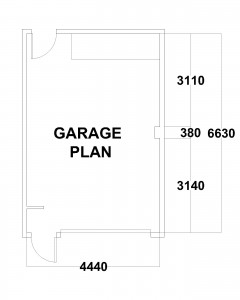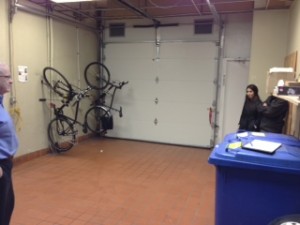Monthly Archives: February 2013
Blog Post 3: Brainstorming Process and Timeline
In this blog post, we will present our brainstorming for the project and the techniques we will use to filter and evaluate ideas. We will also present an overview timeline and milestones for the project. Finally, we will mention our plan for the next step of the project.
Brainstorming phase
Last week, we acquired the Sketch-up drawings of the workshop with the proposed elements (e.g. workbenches). A majority of brainstorming was done during the first meeting with the client. at this point, we openly discussed and brainstormed on which elements would be most vital, and how many would be feasible. We will continue to brainstorm ideas for the construction of the prototype elements for the carport renovation by examining the Sketch-up designs. Aside from the construction procedure, we also need to get the community members involved in the project so they feel a sense of belonging. A good way to connect with the community members would be to meet them during the drop-in sessions. The coordinators and staff at the Learning Exchange are willing to help us throughout the project so we can seek their feedback on our ideas and progress as well as consult them regarding any concerns that we raise.
Timeline and Milestones
Here is our team’s plan for tackling the various stages of the project:
- February 16 to March 10: Brainstorm of construction methods, material selection, and shop drawings
- Consulting coordinators for feedback on feasibility and patron satisfaction
- Finalizing prototype drawings
- Cost evaluation to remain on budget
- March 11, 2013: Construction start
- involving team members and community members
- March 21, 2013: Construction completion
- March 24, 2013: Poster completion
- March 27, 2013: Project documentation completion
Next step
Our team will be visiting the Learning Exchange next Tuesday (during reading break) to meet with the coordinators to go into the specifics and to brief them on our project plan. While we are there, we will also discuss about the construction of the prototype.
In addition, we need to figure out how we can have access to a workshop and tools for the construction of the prototype.
Updates!
Hello all,
How did the meeting go ? What are the client expectations? from design perspective and deadlines. Can I have the minutes of the meeting please?
Thanks,
Hassan
The Initial Stage of the Project
More on the Organization
The UBC Learning Exchange located at 612 Main Street is an organization devoted to the local community of Vancouver’s downtown east side region. The primary focus of this group is centered on personal and neighborhood development within the area. The UBC Learning Exchange offers a variety of services to residents of the area such as language and computer classes or hands-on tutorials related to a variety of craftwork. One aspect of the organization’s philosophy is to build on the strengths of individuals and the community in order to introduce new opportunities or possibilities that may otherwise seem unavailable.
Photo taken by Joseph Braun on Wednesday, January 30th
Project Scope
This specific Community Based Experiential Learning project deals with the renovation of a carport located at the Learning Exchange. The goal of this assignment is to modify the carport in order to accommodate a wider range of possible tutorials such as woodworking, ceramics, or a variety of arts and crafts. To accomplish this goal, a group of students from a prior year developed a conceptual model depicting possible fixtures or equipment to install in this area. This new design includes such installations as work benches, adjustable shelves, and folding desks. The next stage of the project would be to build on this initial design to produce elements of the layout or possible prototypes of the equipment. The final product of this process is still under negotiation but at this stage, we would ideally like to build at least a few elements of this conceptual design and install them in the carport.
Strategies for Completion
At this point, a possible next stage of the process would be to develop the conceptual design completed earlier and to begin considering methods of construction for the millwork. Initially, it may be useful to draft working shop drawings from the completed sketchup design model in preparation for the carpentry stage. We considered requesting time to use UBC’s on-campus wood working shop near the forestry department to begin construction. Access to power tools and a carpentry workspace would be enormously helpful if those accommodations were made available to the project. Combined with input from the local community involved with the learning exchange, we hope to make a significant contribution to the progress of this assignment over the course of the term.


